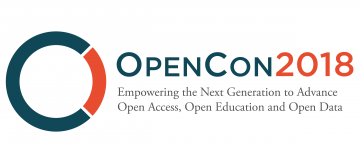
As a member of the Digital Tattoo project, we are constantly striving to create different avenues for student learning, by making high-quality educational resources free and accessible. Because of this, I was impelled to apply to the OpenCon 2018 to learn more about Open Access, Open Education, and Open Data. At the beginning of November, I was pleased to receive a full scholarship to attend the three day conference, which brought together students and early career professionals from around the world to discuss, collaborate, and inspire each other to advance the open movement.
Day One
My views and understandings of the open movement have always come from the perspective of a student, a Digital Tattoo contributor, and a prospective academic librarian. Because of this, it was exciting to see the multitude of diverse ways that open is being explored and advocated for, and the different communities that open initiatives are supporting. The conference’s first panel explored the idea of community as a core concept for cultural change, and examined the current barriers that make open culture difficult to achieve. We heard from speakers working to change the peer review process and practice of closed scholarly research; advocates for the inclusion of Humanities research in Open Science; students exploring African cultural values and how they influence access to makerspaces; librarians supporting the development and use of open vocabularies with and for Indigenous communities in knowledge organization systems, and innovators providing resources and translations for students to find scholarship opportunities. It was inspiring to hear the urgent and impassioned on-the-ground work of advocates applying open practices to their fields, and to see the real impact of their efforts on the global community.
In the afternoon, we applied design thinking to different scenarios with the goal of developing open advocacy. I was able to meet and work with librarians from different institutions and levels of our careers, and exchange ideas, hear their respective challenges, and celebrate our successes. This was an empowering experience in understanding the different ways in which open culture can be explored in the information profession.
Day Two
The following day, we focused on the ideas of diversity, equity, and inclusion in open research and education. A panel of advocates prompted a critical discussion of the open movement, and its ability to perpetuate the same oppressive and marginalizing systems of power that are apparent in higher education. This was an eye-opening dialogue on the different ways that open is not always positive or neutral. While remaining critical, panel speakers also displayed positive experiences open can create, such as an art platform for social transformation and healing. Other examples included monitoring and mapping higher education institutions that have landscapes of access, inclusion, and exclusion of trans, intersex, and non-binary communities. In addition, speakers talked about expanding definitions of inclusive infrastructures in open science, and broadening knowledge creation beyond higher education institutions to include communities as collaborators.
This panel of speakers was one of my favourite parts of the conference. As advocates, it can be easy to fall into the thought process that we must be constantly engaging with others in the positive aspects of our movement. However, this panel encouraged us to stop, think critically, and participate in evaluative discourse with others about the way we practice open. This allows us to make personal reflection a constant part of our work. It was an important reminder to maintain an awareness of which voices we may be unconsciously excluding in our professional practice.
Day Three
The final day had us working together in a Do-a-thon, where we collaborated on a project that would extend beyond the conference. I worked alongside students and professionals as we brainstormed ways to restructure an OpenPraxis Forum. The platform would feature the work of early career researchers, their methodologies, and provide a space for learning and scholarly collaboration.
We discussed different ways of sharing and valuing knowledge, how to challenge existing hierarchical powers and governance structures in research and education, and how to create an online space that is conducive to collaborative learning and knowledge production. For me, this felt applicable to the work we do at Digital Tattoo, and I used that viewpoint to contribute to and learn from the group. It was an incredible day of diverse individuals feeding off each others energy, and acting as both learners and teachers. This day was representative of my entire experience at OpenCon 2018, where I was able to share my story of what has led me to become an open advocate, hear others’ experiences, connect with people in different professions and countries, and better understand the vast landscape of open culture and the possibilities it can promise.
Before OpenCon, I had a very narrow understanding of open culture and how it could be practiced. In attending the conference, my eyes were quite literally opened, and I was inspired to dive in head first. While I still have a lot to learn, I feel supported by the organizers and attendees to apply open and design thinking to both my studies and work with Digital Tattoo, and find ways to connect readers and contributors to open access repositories, open education resources, and advocates from the open movement.
I am incredibly grateful for the opportunity to take part in this conference, and would like to thank SPARC, the Right to Research Coalition, and the OpenCon 2018 organizing committee for not only planning and orchestrating this event, but for giving me the opportunity to participate in it. For those considering joining the open movement, I would encourage you to take a look at the numerous resources from OpenCon 2018 (and years past) that are accessible through their website. As well, check out Digital Tattoo’s tutorial content and articles investigating Open Access, to find out ways you can bring the open movement to your community.

